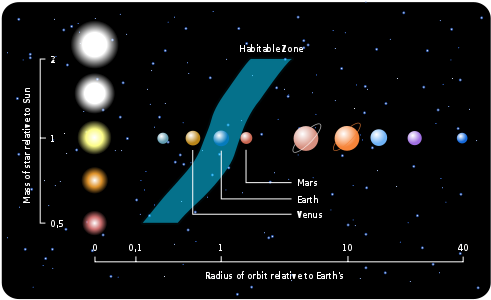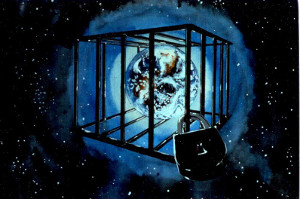Do Aliens Exist?

A question that has always puzzled us since we were kids was the existence of aliens. As of today there are no real proof the existence of aliens but that doesn’t stop us from speculating on their existence.

We can take a mathematical approach in predicting the existence of aliens in our universe, as it does seem quite viable that in a vast space stretching 92 billion light-years (1 light-year is 9.46 trillion kilometers), there being at least some form of life other than us on earth. The big bang was the massive explosion which gave birth to the universe that we know today, from a point called the singularity smaller than an atom. This super-massive explosion spewed matter which took form of 10^24 stars and several billion more planets. If we say that around 5% of those stars are similar to our sun, then this gives us 500 billion-billion stars that very sun-like. Now we have to consider the planets that have features similar to the earth to nurture life. Many scientists believe in a specific orbital range of planets around the star called the Goldilocks zone, where the temperature of the planet is perfect for the existence of liquid water, which they believe to be the key for any life in the universe. A recent study has shown that 12% percent of planets orbiting sun-like stars fall within the Goldilocks zone (Habitable zone). Assuming that one planets falls within the Goldilocks zone, we have 100 billion-billion planets which may be sprawling with like in the universe.

Again assuming that 1% of those planets pave the way for the development of intelligent life, then it gives us 10 million-billion (10 quadrillion) intelligent civilizations just like us humans in the universe and 100,000 in our Milky-way galaxy. But every time we peer into the night-sky, let’s down our expectations of seeing aliens whizzing by in galactic space ships. So why haven’t even seen even one of the 10 quadrillion intelligent alien civilizations? The Fermi paradox explains just that.
But before we look into why we haven’t evidenced any intelligent life anywhere in the universe, we have to first consider how intelligent some alien life might have become. Earth is part of a solar system which is very young compared to many others in the universe with an age of 4.54 billion years (It sounds like a lot but in the scale of the cosmos it’s comparatively young). There are several other solar systems which are much older. For the sake of the explanation, let’s think of a solar system with a planet that is 8 billion years old that support alien life. This means that the alien life on the older planet has 3.46 billion years as head start to evolve and prosper. In comparison, it took roughly the same amount of time for bacteria like single celled organisms to evolve into modern day humans. This simply means that we humans can be compared to single celled creatures when looking at the evolved alien organisms. From this point of view the aliens would be almost god-like, considering that they would be immensely evolved and technologically progressed beings. But it does become out of our depths to imagine such creatures with great intelligence, hence something called the Kardashev Scale was developed to categorize all the possible intelligent civilizations out there.
Types of intelligent civilizations
The Kadashev’s scale attempts to categorize different levels of intelligent organisms according to their ability to use different levels of energy. The scale is divided into three main category the first one being Type I civilizations. Type I civilization of  intelligent organisms have the ability to utilize all of the energy of the planet they reside in. We humans are almost Type I civilizations, however we’re not quite there yet. Type II civilizations have the ability to harness all of the energy of their star in their solar system. This is a very difficult feat to achieve but scientists have come up with a model called the Dyson sphere which might be used to achieve something like this. Finally Type III civilization would be able to control their whole galaxy and extract entry from that entire system.
intelligent organisms have the ability to utilize all of the energy of the planet they reside in. We humans are almost Type I civilizations, however we’re not quite there yet. Type II civilizations have the ability to harness all of the energy of their star in their solar system. This is a very difficult feat to achieve but scientists have come up with a model called the Dyson sphere which might be used to achieve something like this. Finally Type III civilization would be able to control their whole galaxy and extract entry from that entire system.
Our hypothetical planet that is 3.46 billion years older than we are might belong to Type III civilization and possess immense power, but we haven’t seen even a glimpse of them, so why is that?
The Fermi Paradox
We can assume that a successful alien civilization would carry on their legacy and try to colonize as many planets as they can. This might be done simply to expand their population, because of congestion in their home planet or lack of resources or they might just want destroy entire intelligent civilizations to minimize them being a threat. Either way, the aliens would have to come in contact with the other civilizations to do any of this but we still haven’t noticed even a glimpse of them. This is the Fermi Paradox.
So why haven’t we seen any aliens? The first hypothetical solution to the Fermi paradox is that alien life does not exist. This hypothesis treats life as a very rare attribute of nature, and earth is the only planet that has somehow produced living beings. While this may hold true with the current lack of information we have on how life was first created and our perception of lack of alien life, it doesn’t produce convincing arguments to show why other earth like planets with very similar conditions might not have any life, considering the scale of the universe.
But let’s consider a similar scenario with a hypothetical idea called the Great Filter. This is a point in time which all species have to pass through in their process of evolution into intelligent beings. But this filter poses as an impedance in the evolution process such that no life would be able to pass it. An example of a Great filter might be some sort of disease that wipes out all intelligent organisms or even war within the civilization or that some other alien civilization chooses to exterminate any other civilizations except themselves. But this also mean that we are yet to face our Great filter; even though we are unsure what it might be, it definitely would not be a great experience for any of us living on earth.
But aside from this let’s look at the possibility of aliens existing, and let’s try to figure out the reasons that we’ve never come in contact with them.
The first idea considering the super-intelligent civilization is about the whether they have the same ideals of us, such as making contact with other alien civilizations and colonization. These concepts might be very primitive to aliens who have the power and knowledge to control the whole universe at their will. Drawing upon the same concept, these aliens would see humans who are billions of years behind in evolution as very primitive organisms. Our intelligence would be equivalent to ants when compared to their collective knowledge of the aliens. This would give them no reason to contact us, as there is a huge barrier to communication as we wouldn’t be able to comprehend anything they say. While at the same time our lack of intelligence would make us insignificant to them in the scale of the cosmos.
The other hypothesis is that there is a “predator” alien civilization which is much more advanced than any other civilization in the universe and it wipes out all the other civilizations that it comes contact to. This concept has a sci-fi vibe to it, but never the less it is a possibility, considering the principle behind the predator’s actions. The predator alien civilizations looks at other civilizations as threats, hence finds the need to exterminate them.
 The next concept is called the Zoo Hypothesis and it carries the idea that the aliens are aware and observing us from afar but we are unaware of this. This might be done because we haven’t reached a certain level of intelligence for us to communicate with them, hence contact is futile and they are waiting till our intelligence grows fit for inter-civilization communication.
The next concept is called the Zoo Hypothesis and it carries the idea that the aliens are aware and observing us from afar but we are unaware of this. This might be done because we haven’t reached a certain level of intelligence for us to communicate with them, hence contact is futile and they are waiting till our intelligence grows fit for inter-civilization communication.
No matter what the possibility is everything seems out of the book of science fiction and it becomes more interesting the more we think about it. But it is clear that we are just a little drop of paint in the painting of the universe, and the Fermi paradox shows the truth behind this.
